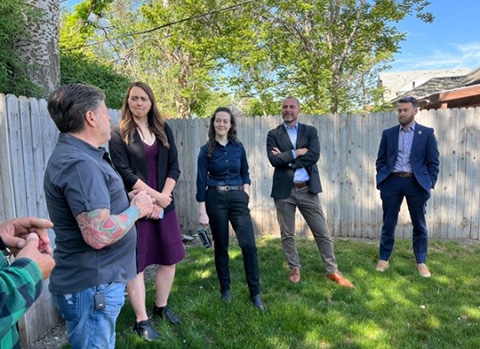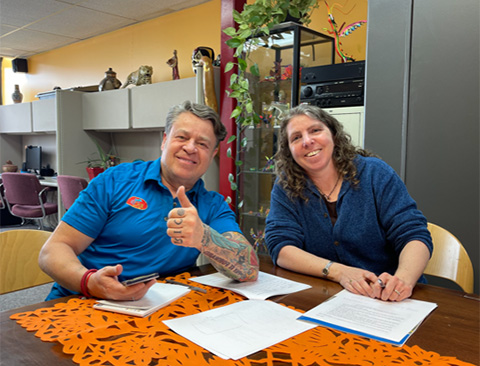Salt Lake Solar Leaders Achieve Solar Plus Storage for Low-to-Moderate Income Businesses
July 22, 2024 by Jennifer Eden and Ofa Matagi, Utah Clean Energy, and Christopher Thomas, Salt Lake City Sustainability
The Solar Energy Innovation Network (SEIN) Round 3 multistakeholder team, led by Salt Lake City's Department of Sustainability, explored gaps to equitable solar in Salt Lake City's Westside neighborhood.
The views expressed herein do not necessarily represent the views of NREL, the U.S. Department of Energy, or the U.S. government.
As participants in SEIN, Utah Clean Energy and Salt Lake City Sustainability collaborated with a diverse group of low- to moderate-income (LMI) and Black, indigenous, and people of color (BIPOC) business owners in Salt Lake's Westside. This team addressed barriers of cost, time, and a lack of trust to access the clean energy benefits of rooftop solar and battery storage.
Barriers to Solar-Plus-Storage Adoption for Small Businesses Owned by Black, Indigenous, and People of Color
The first step to bridge gaps to equitable solar deployment was to understand what was hindering solar adoption in these communities. Feedback from Westside community members and business owners helped the team identify four primary barriers to installing rooftop solar and associated battery storage: time, trust, expense, and expertise. These business owners are occupied with running a business and have little time to familiarize themselves with solar-plus-storage opportunities.
Complex utility rate structures for solar plus storage and technical jargon may add to the confusion. Additionally, the upfront costs and lack of trusted relationships with solar professionals make these projects difficult to start, let alone complete. Finally, outreach to these business sectors must identify and respect their cultural and linguistic preferences.
The Salt Lake Solar Leaders' Team Goals
- Reduce energy costs
- Increase energy resilience for their businesses and community
- Serve as a positive example for their community
- Be an innovator
- Promote a clean and healthy community.
Despite these barriers, Westside business owners expressed interest and enthusiasm in solar-plus-storage projects for a variety of reasons: to reduce energy costs, increase energy resilience for their businesses, and serve as a positive example for their community through the adoption of solar plus storage. Through this engagement, five Westside business owners are committed to serving as community advocates for solar adoption. Dubbed Salt Lake Solar Leaders, these ambassadors are championing collective efforts to invest in a healthier future, not just for their own families or businesses but for the community at large.

Eric Stone (left) and Isaac Atencio, Salt Lake Solar Leaders and owners of Salt Lake Barber Co. and Culture Coffee. Photo from Chris Mejia, Salt Lake Barber Co. and Culture Coffee

Alejandro Moreno, U.S. Department of Energy associate principal deputy assistant secretary, (second from right) listening to Jorge Fierro (left) talk about his goals for solar energy. Photo from Jennifer Eden, Utah Clean Energy
Earning Community Trust
Connecting with the Westside business community in an authentic way was a crucial first step for the team to create meaningful and longstanding relationships. Historically underserved LMI communities may be wary of organizations that are not rooted in their communities. Whether this is due to a lack of familiarity or exploitative practices, Salt Lake City and partners needed to establish trust between the SEIN team and project partners through respectful dialogue.

By collaborating with community stakeholders, such as Suazo Business Center and the Utah Division of Multicultural Affairs, the team was able to connect with anchor business owners of the Westside. These trusted introductions were instrumental to the team's success in building meaningful relationships.
Conversations over the following months allowed Salt Lake City and partners to learn from on another and better understand community members' priorities, concerns, and goals. In addition, Salt Lake Solar Leaders were able to learn about pathways to solar and storage adoption.
As a result of these valued relationships, Salt Lake Solar Leaders and the Salt Lake City SEIN team have built a community network that can promote the adoption of clean solar power and community resilience.
Meet Some of the Salt Lake Solar Leaders
Here are some of the business owners who participated in the multistakeholder SEIN Round 3 team.
Salt Lake Barber Co. and Culture Coffee are two small businesses co-owned by Isaac Atencio and Eric Stone.
Salt Lake Barber Co.'s second location shares a space in Salt Lake City's Fairpark neighborhood with Culture Coffee. They are renting their building from NeighborWorks Salt Lake, a local economic development nonprofit based in Salt Lake City's Westside.
Salt Lake Barber Co. and Culture Coffee "want to provide a true community hub that serves folks from all over the Westside," according to Atencio and Stone. Their landlord, NeighborWorks, shares many of the same values and recognizes that installing solar plus storage at this location will benefit not only Salt Lake Barber Co. and Culture Coffee but the larger community as well.
Lessons Learned
- Solving the split incentive: A landlord/tenant situation (where the landlord owns the solar and the tenant pays the utility bills) can achieve solar plus storage if their goals align and if additional funding opportunities can be realized so the landlord can afford to install solar plus storage.
- Solar installers, like community members, need to be brought into conversations to build mutual trust between the installers and the community members.
- Community examples of clean energy solutions are critical to dismantling barriers and realizing opportunities.

Jorge Fierro, owner of Rico Brand, started selling fully cooked, ready-to-eat pinto beans at the Salt Lake City Farmer's Market in 1997. Over the years, his business has expanded to become a Mexican food staple available throughout Utah and expanding through the West. Jorge is a well-known, dynamic, community-oriented presence in Salt Lake City's Westside.
He wants Rico Brand to be an example of progress in his community, and he wants to contribute to the health of his community through clean energy and electrifying his fleet of delivery vehicles to help tackle air quality problems.
Lessons Learned
- Conversations lead to opportunities: When exploring possibilities for electric vehicle charging, Salt Lake Solar Leaders found out about a Salt Lake City Economic Development Loan Fund, which is well-suited and favorable for solar loans. They had not previously realized how this loan fund could provide low-cost bridge financing for commercial solar installations.
- A solar advocate can serve as a liaison between business owners and solar installers—helping business owners understand solar-plus-storage options, identify clean energy priorities, and navigate the solar bid process.
Pathways to Solar Adoption for Small Businesses Owned by Black, Indigenous, and People of Color
Ultimately, the goal of building community relationships is to provide business owners with the resources to install solar plus storage if it is a good fit for their business. The experiences of the Salt Lake Solar Leaders and their community storytelling will provide much-needed trusted information for other Westside community businesses that are interested in pursuing solar plus storage.
In collaboration with NREL researchers, the Salt Lake City SEIN project recently released fact sheets: Financing Solar + Storage for Small Businesses in Underserved Communities and Utility Programs Supporting Customer-Sited Battery Storage: Program Design to Ensure Mutual Benefits. These fact sheets provide a summary of financial tools and utility programs that inform the opportunities for solar as well as solar and battery installations for businesses in low-income and disadvantaged communities.
“We are so excited to be leading the way for new, local, community-oriented businesses in Salt Lake's Westside. We believe that all it takes is a small catalyst to see true change within a community, and we recognize that there can be a huge difference between what we know as ‘gentrification' versus true community uplifting.
“This solar opportunity is another chance to get out in front of the pack and help create equitable and accessible opportunities for small businesses on the west side. We are grateful to also partner with our landlords, NeighborWorks Salt Lake, who share our vision of a locally charged, community-led Westside!”
–Isaac Atencio, co-owner, Salt Lake Barber Co. and Culture Coffee
The Salt Lake City multistakeholder project also developed a Solar-Plus-Storage Toolkit to provide local businesses with trusted, locally relevant guidelines for procuring solar plus storage. Additionally, Salt Lake City and Utah Clean Energy have received a grant from Urban Sustainability Directors Network to install solar-plus-storage systems for target community businesses. This process is underway and will create tangible examples of successful solar-plus-storage projects.
Subsequent community storytelling should increase the interest in and uptake of solar in our Westside Communities and demonstrate the potential efficacy of solar-plus-storage projects in these communities.
Interested in learning more about SEIN? Subscribe to our mailing list.
Share

